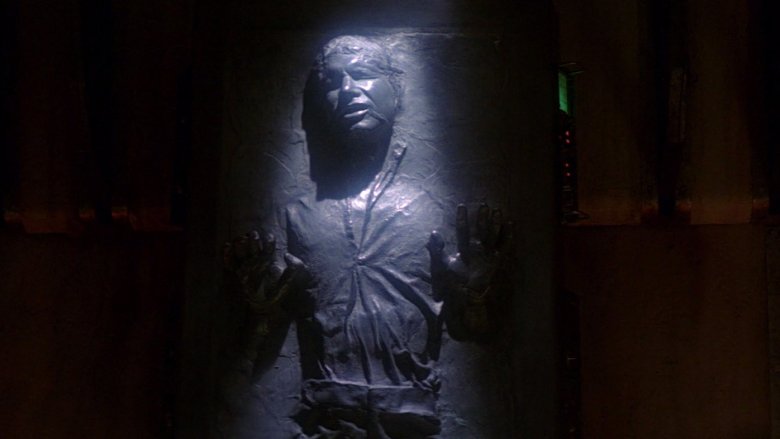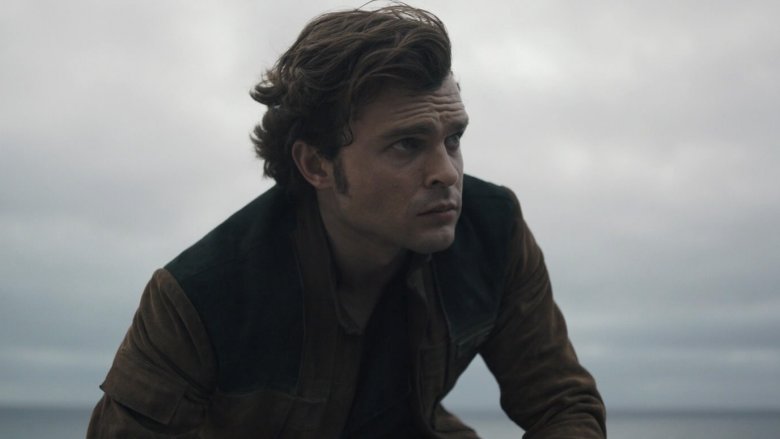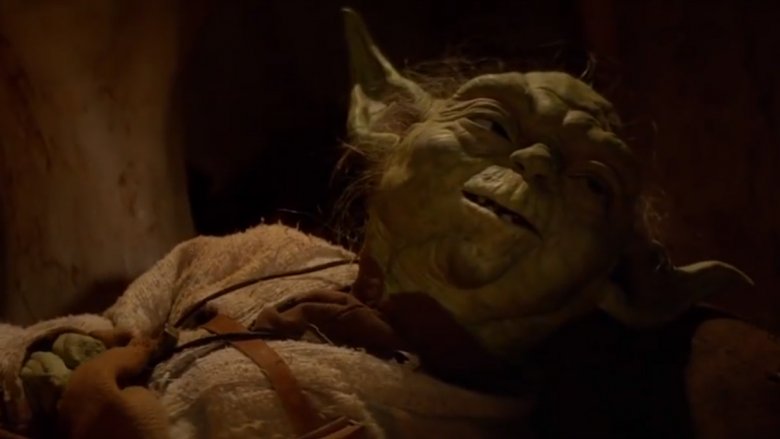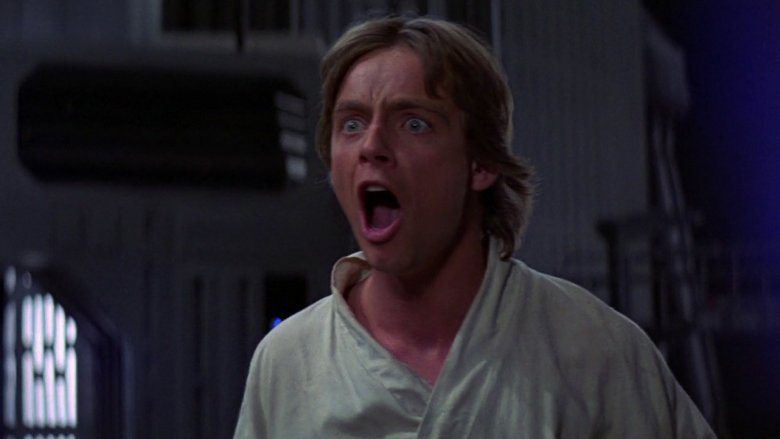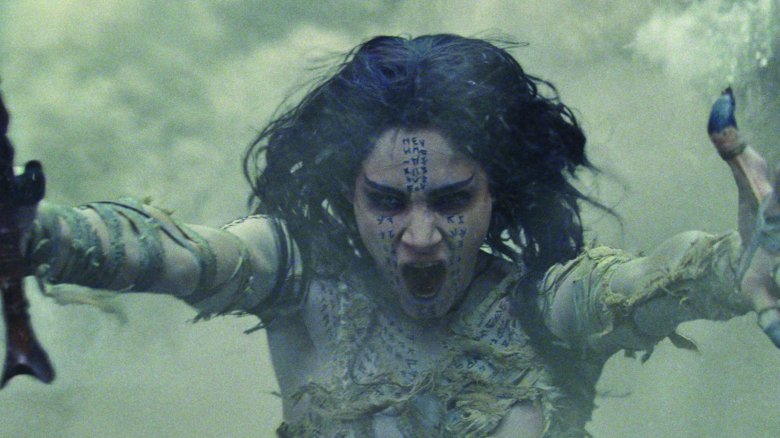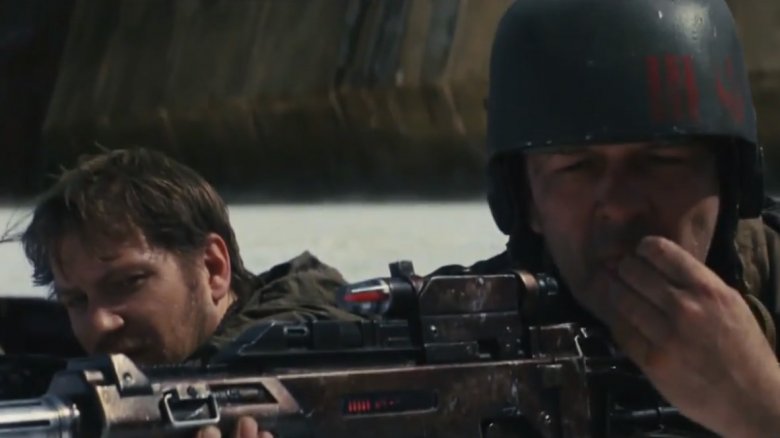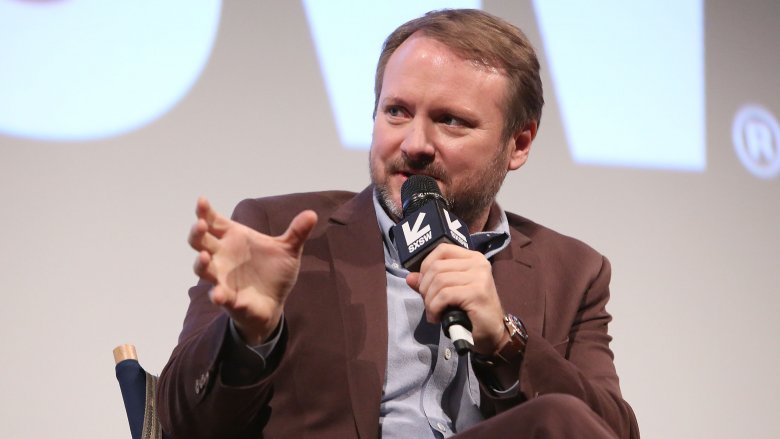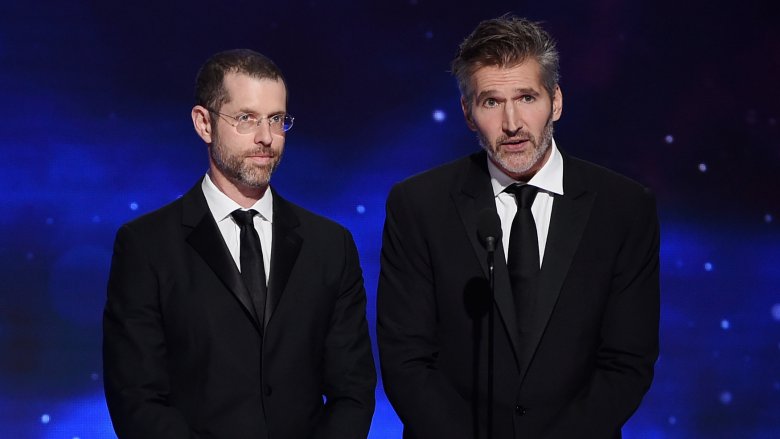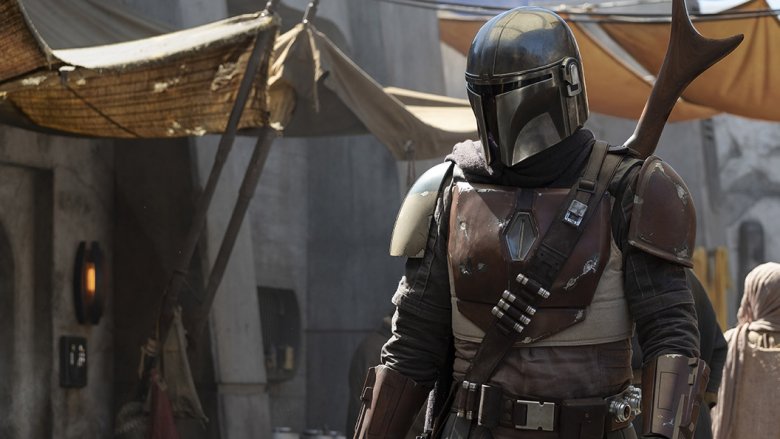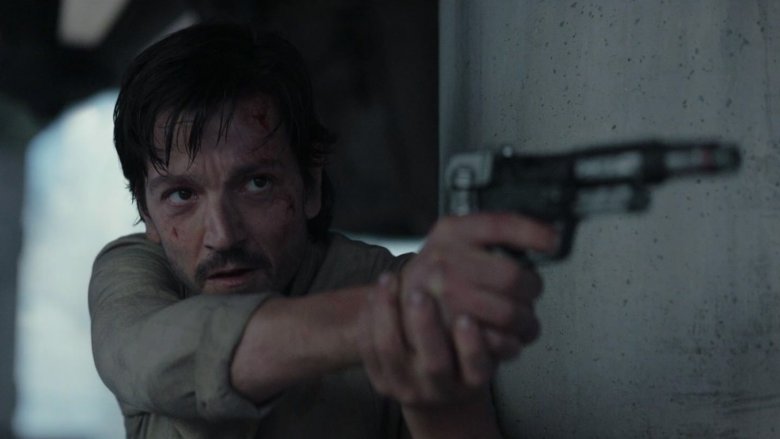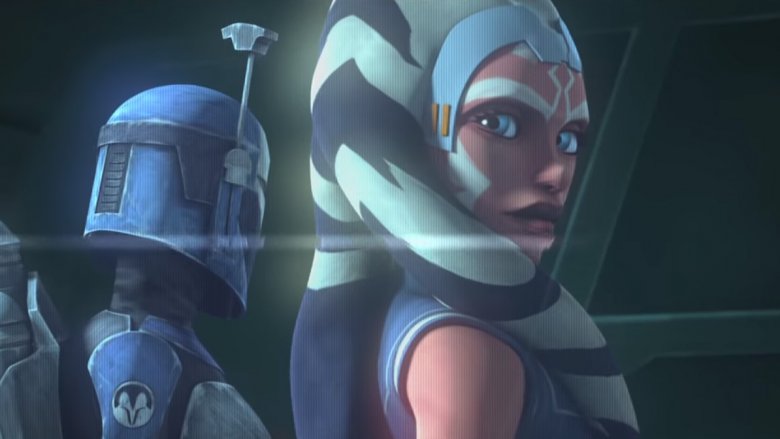The Real Reason Star Wars Movies Will Go On Hiatus After Episode IX
In an April 2019 interview with Bloomberg, Walt Disney Chairman and CEO Bob Iger made an unexpected announcement. He stated that, after the release of Star Wars: Episode IX — The Rise of Skywalker, the Star Wars franchise will go on "hiatus" for a while. Iger didn't give much information on the reason why Star Wars is taking a break, apart from saying, "We will take a pause, some time, and reset, because the Skywalker saga comes to an end with this ninth movie."
Although he was reluctant at that time to give a firm date for when the next Star Wars film would be coming, Disney later released their upcoming slate of films on May 7, 2019, revealing that the first post-Episode IX return to the galaxy far, far away is scheduled to drop in 2022.
A couple years ago, we were led to believe that we'd be getting an endless string of Star Wars films every year or two, stretching into the future for all eternity. Why did Disney suddenly decide to put the franchise in carbonite?
The internet is abuzz with speculation over why this could be, and what this will mean for the future of Star Wars. We have a few theories of our own, so let's run down the most likely reasons why Star Wars films are going on hiatus after The Rise of Skywalker, and what other projects will tide us over until the hiatus ends.
Solo was a box office thermal detonator
One reason for the impending Star Wars hiatus might be because the most recent Star Wars film to hit theaters ended up being, to everyone's surprise, a financial failure. Initially projected to make $130 million to $150 million domestically during its opening weekend, 2018's Solo: A Star Wars Story only ended up making $103 million that weekend, and it did even worse internationally. As of a year later, its worldwide total is sitting at $392.9 million, against a budget of $275-300 million.
That might sound like a modest success, but it doesn't take into account that for big tentpole releases like Solo, studios often spend hundreds of millions of dollars more on marketing — numbers that aren't always made public. So, much like the perpetually in-debt smuggler himself, Disney is still almost definitely in the hole over Solo.
It's definitely not the whole story, but we'd be shocked if Solo's failure wasn't a piece of the puzzle. It would make sense that, after getting burned by a spin-off of middling quality, Disney would realize that Star Wars films aren't guaranteed to be a box office success every single time, and so they'd probably get more picky about which projects they'd move forward on and which ones they'd shelve.
Star Wars fatigue
Although the lackluster performance of Solo may have been a contributing factor in Disney's decision to cut back on their production of Star Wars movies, the film's financial failure may have also just been a symptom of a deeper issue.
Some have blamed Solo's underwhelming numbers on a phenomenon they have dubbed "Star Wars fatigue." With a new Star Wars movie coming out every December, three years in a row (The Force Awakens, Rogue One, and The Last Jedi), followed by yet another new Star Wars film just five months later (Solo), audiences might have just gotten a little sick of Star Wars.
Sounds crazy, right? Given how dedicated the fanbase is and how eagerly fans have anticipated each new Star Wars film in previous eras, this seems like an almost unthinkable concept. That being said, pretty much any market can become oversaturated. There is an amount that is too much of any good thing. Maybe Solo finally answered the question of how much Star Wars is too much.
If Disney believes that Star Wars fatigue is real, and hurting their films' profitability, you bet they'd start decreasing the number of Star Wars films they were pumping out. A hiatus could be just the thing to give the market some time to recover.
All the spinoffs have been cancelled
Bob Iger's recent announcement isn't the first time that Disney decided to cut back on Star Wars. In June of 2018, Collider reported that the studio was pulling the plug on all of the previously planned Star Wars spin-offs. These films were supposed to focus on characters such as Boba Fett, Obi-Wan Kenobi, and Yoda.
One of the most potentially exciting elements of these smaller spin-off films was the level of talent attached. The Boba Fett film was supposed to be helmed by Logan director James Mangold. Billy Elliot's Stephen Daldry was in talks, at one point, to direct the Obi-Wan film. The cancellation of the Obi-Wan film is particularly heartbreaking, because despite the despite the numerous faults of the prequels, one thing on which pretty much everyone agrees is that Ewan McGregor was fantastic as Obi Wan Kenobi, and during a red carpet interview, he revealed that he wants a standalone Obi-Wan film as much as the rest of us.
With all of this taken into consideration, one possible reading of Iger's announcement is that Disney didn't decide to go on a hiatus after all. This gap in Star Wars films is just occurring because they cancelled all their anthology films, and the next big trilogy isn't ready yet. They might simply not have any Star Wars left to release, and they're playing it off as an intentional decision to take a break.
Turns out a "shared universe" is harder than it looks
Given the unprecedented popularity of the Marvel Cinematic Universe, other film studios have been doing their best over the past decade to decode their formula for success. The thing that most of them settled on as the key element to replicate was the idea of a "shared universe," an interconnected series of films that all take place in the same setting, each with a different focus but with characters and plot threads that recur from one installment to the next.
This is sort of how Star Wars has already been operating for decades, with a massive universe shared across movies, novels, comics, video games, and more, so it seems like a natural fit for a Marvel-style ongoing cinematic universe... right?
It's a big gamble. If your cinematic universe works, your audience is theoretically pre-sold for every future film you release. However, if you ever make a real stinker, filmgoers might abandon ship altogether, writing off not just one film, but your entire franchise. Maybe this is why, outside of the MCU (and to a lesser extent the DCEU), pretty much every other attempt at a shared universe has failed, most notably with the perpetual butt of the joke that is Universal's "Dark Universe," which was supposed to start with Dracula Untold in 2014, before immediately being rebooted with The Mummy in 2017, before being abruptly abandoned altogether... sort of.
We can't say for certain, but perhaps the failure of some of these lesser MCU knockoffs has scared Disney a bit from diving headfirst into the shared universe deep end.
Some are still salty over The Last Jedi
Although The Last Jedi was generally beloved by audiences, financially successful, and praised by most critics for being a bold step forward for the Star Wars franchise, there was a small vocal minority that was... not happy with the film at all.
The validity of these complaints varies dramatically. On the more reasonable end are discussions about whether or not the rules of lightspeed travel as presented in the film jive with what we've seen in Star Wars before. At the completely unreasonable end are reactionary tantrums about "forced diversity." We have no interest in going too deep on that one, but while we're here, all we have to say is that we believe that Star Wars is for everyone. Heroes can and should be played by a variety of people, not just white men.
Despite the fact that the most vitriolic of these gripes stemmed from only a small slice of the population, some measurable damage was done, most notably in the film's audience approval score on Rotten Tomatoes, which took a sizable hit due to targeted efforts by disgruntled trolls.
Though it's difficult to say exactly which fan criticisms Disney may or may not be listening to, this whole fiasco might be a contributing factor in the decision to take a little break to reflect, with an eye towards becoming a little more deliberate with their filmmaking decisions in the future. If so, let's hope this experience teaches them the right lessons.
Making room for Rian Johnson's trilogy
Even before The Last Jedi hit theaters, Lucasfilm announced that they were so happy with Rian Johnson's work on the franchise so far that he'd be getting a much bigger role in Star Wars moving forward. In November of 2017, they released a statement revealing that Johnson would be getting not just another film after The Last Jedi, but an entire new trilogy that would be his to build from the ground up.
There was, however, a brief moment in February 2019 when we had a scare that this wasn't going to be the case. We'd link to the source of the rumors that Johnson's trilogy was no longer happening — apparently originating on the blog SuperBroMovies — but it has since been deleted, because it was patently untrue. As soon as Johnson heard about it, he immediately cleared things up on Twitter, saying, "No it isn't true, I'm still working on the trilogy. With all due respect to the movie bros, who I'm sure are lovely kind bros with good fraternal intentions."
It's safe to assume that when Bob Iger said (in the aforementioned Bloomberg interview), "There are movies in development, but we have not announced them," he was, in part, referring to Johnson's trilogy. Though little is certain about the future of Star Wars, Johnson's continuing involvement in the franchise is pretty much guaranteed. If that means we get more scenes like the fight in Snoke's throne room, count us in.
A break before Benioff and Weiss take over
As excited as we are about Rian Johnson's upcoming series of films, it looks like he's not going to be the first director coming up to bat after Episode IX. We've known for a while that Game of Thrones creators David Benioff and D.B. Weiss have been working on their own slate of Star Wars films, but in a recent interview with Variety, they confirmed that the next Star Wars film to be released will be one with them at the helm.
In some ways, this is great news. Perhaps the greatest skill that Benioff and Weiss demonstrated while making Game of Thrones is knowing how to take something complex and fantastical and make it accessible to the general public. At the same time though, that series was not without its flaws, especially once the show's plots got ahead of the books, and presumably Benioff and Weiss had to do more of the heavy lifting themselves.
The truth is that these two are still fairly new to screenwriting, and thus far their track record hasn't been consistent, so this new trilogy could go either way. Game of Thrones was undeniably great at its peak, but it was also Weiss' first produced film or television credit. Benioff's had a longer career writing for the screen, but he also co-wrote the much maligned X-Men Origins: Wolverine.
We can't say anything for certain, because in the immortal words of Yoda, "Always is motion is the future."
The Mandalorian is our new hope
Fortunately, a hiatus from Star Wars films doesn't mean a hiatus from Star Wars altogether. Although we've been teased with the possibility of a live action Star Wars series for decades — most recently with Star Wars: Underworld — pretty much all ongoing Star Wars side projects were killed when Disney bought the franchise.
Now, after years of waiting, it's looking like a live action Star Wars show is actually going to happen, and we couldn't be more excited about who is going to be running things. Jon Favreau, the same guy who got the MCU started on the right foot, is going to help shepherd Star Wars into the realm of live action television.
The series is called The Mandalorian, and it tells the story of a lone Mandalorian gunfighter living in the era after the fall of the Galactic Empire, but before the rise of the First Order. In October 2018, Favreau revealed the first teaser image on Instagram. He also later revealed the premise of the show, in an homage to the classic Star Wars title crawl. Then, during a panel at Star Wars Celebration Chicago 2019, Favreau showed off some footage and introduced the audience to the core cast of the show, including Carl Weathers. If that wasn't enough, also confirmed to be in the cast are Werner Herzog and Taika Waititi.
The series premieres on the new Disney+ streaming service on November 12, 2019.
Rogue One is also returning
The Mandalorian isn't the only new live action series that Star Wars is releasing to help get us through the hiatus. If space westerns aren't your thing, how about a spy thriller?
In November of 2018, Bob Iger also announced that Disney was producing a live action series that would serve as a prequel to Rogue One, specifically focusing on the exploits of rebel captain Cassian Andor.
This press release also confirmed that the magnificent Diego Luna would be reprising his role as this charming yet morally gray Rebellion lifer. He is quoted in the announcement as saying, "Going back to the Star Wars universe is very special for me... We have a fantastic adventure ahead of us, and this new exciting format will give us the chance to explore this character more deeply." Also attached are writer Stephen Schiff, who is best known for his work on the FX series The Americans, and Jared Bush, co-writer of the Disney film Moana.
We don't know much else about this Disney+ series yet, but given that it isn't set to start filming until October 2019, it's definitely not going to debut alongside The Mandalorian. We eagerly await the release of the as-yet untitled show, while acknowledging that it's still probably quite a ways off.
Return of the clones
If two new Star Wars shows still aren't enough for you, you'll be pleased to learn that an old friend is also returning for one last hurrah. If you never watched Star Wars: The Clone Wars before, start catching up now. It's coming back, and it looks better than ever.
An animated spin-off set between Episodes II and III, this Daytime Emmy Award-winning series was beloved for finally delivering on the promise of the prequel era of Star Wars in a way that the prequel films themselves never did. However, after six seasons, the series was cancelled with many ongoing plot threads still left hanging. That's why fans were thrilled when, at San Diego Comic Con in 2018, Lucasfilm announced that the series would finally return and get the ending it deserved. All we have so far is a teaser trailer, but it's jaw dropping.
Although the idea of a Star Wars hiatus definitely has us filled with some degree of uncertainty, reviving this much-beloved series is perhaps the clearest sign of all that although new Star Wars films are going away for a little bit, Disney is still very much invested in giving fans a steady supply of new stories for years to come. That's great news. We were starting to worry that this old stack of Knights of the Old Republic games wasn't going to be enough to get us through the next dry spell.
